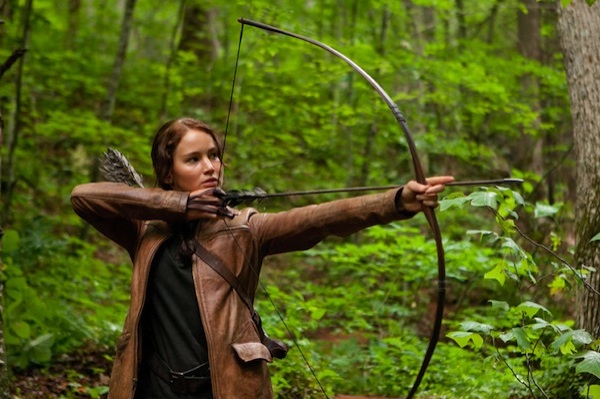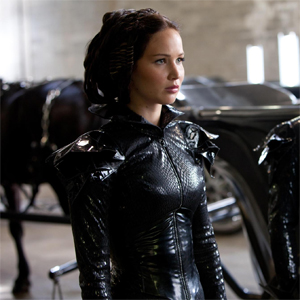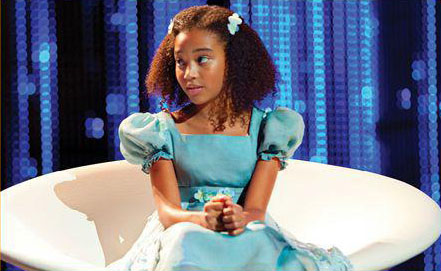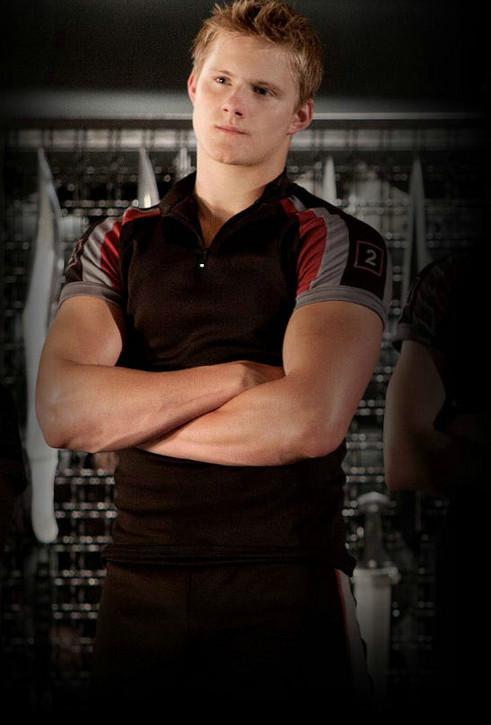Hunger Games
The HUNGER GAMES is a mediocre movie which has been hyped to the point of hyperventilation. I am impressed with the marketing campaign, even to the point where the dictionary site I visit had a picture of the heroine from the film.
I saw it this week, and have not read the book on which it is based, and I acknowledge that this is merely the first third of the trilogy, but, even so, I was disappointed.
SPOILER WARNING! I give away several important plot twists, including the ending, so read no further if you mean to see this movie!
Now, I know that the problem with an overhyped film is that it cannot live up to the hype. For the same reason that I liked the third MATRIX movie, I was disappointed by HUNGER GAMES. Namely, I had heard so much bad press about the third MATRIX movie, that unless a vent of pure sewage had erupted from the screen, it would have been better than advertised. Likewise, after all this hype, fire should have shot from the screen.
But being forewarned against the danger of over-expectation, I was nonetheless expecting a movie better than JOHN CARTER OF MARS, which bombed badly, but which to me seemed like a perfectly enjoyable sci-fi action flick, based vaguely on a beloved pulp classic by Edgar Rice Burroughs . This was not even up to that level.
Or, to be fair, since I knew I was not in the target audience range, I was expecting a gripping drama, something at least as moving as, for example, A WRINKLE IN TIME by Madeleine L’Engle, or perhaps ENCHANTRESS FROM THE STARS by Sylvia Louise Engdahl.
For those of you who from planet Barsoom ergo out of reach of the hype campaign, the conceit of HUNGER GAMES is Shirley Jackson’s THE LOTTERY meets THE MOST DANGEROUS GAME by Richard Connell and rips off BATTLE ROYALE by Koushun Takami.
The premise is that is that in a dystopian future, the Pan-American state of Panem, in order to punish the outlying districts for rebellions of seventy years past, select two children from each of twelve districts by lottery, who are set into a combination gladiatorial game and wilderness survival test, and the twenty-four children kill each other or dies from starvation or exposure to the elements until there is but one survivor.
Sponsors in the viewing audience have the right from time to time to drop packages of food or medicine into the woods to support their favorite. The games are surrounded with appallingly shallow media circus atmosphere, with the gladiators of ‘tributes’ feted and treated like athletic stars, and forced to play to the sympathies of the crowd in order to win sponsors. The masters of ceremonies basically control the outcome of the game, since they can introduce artificial disasters and dangers, such as forest fires and vicious beasts, in order to herd gladiators back to the fray, or to increase the drama for the viewing audience.
The heroine, Katniss Everdeen is a bow hunter and poacher from District Twelve, a Hooverville-lookalike coalmining town, who volunteers to take her younger sister’s place when she loses the lottery.
The balance of the film concerns her training by her handlers to make her into an athletic star pleasing to the mob, and the various dangers, alliances, betrayals, and acts of kindness or cruelty which play out during the Hobbesian war of all against all.
Let me list what I liked about the film before listing the sources of my discontent.
The basic concept is simple, dark, and powerful, a ghastly indictment of the voyeuristic craving for blood and death which underpins violent and dangerous contests. The updating of Roman gladiatorial circus shows with modern sporting event commentaries or ‘Reality TV’ tropes is clever and trenchant. The audience should be a little uncomfortable enjoying a violent show about how bad it is to enjoy violent shows.
Also, the plot is solid, well constructed, with unexpected turns and betrayals, and the events follow logically one from another, without any deus ex machine moments or plot holes. The characters were sharply and clearly drawn and the acting was top-notch.
Second, the main character’s defining moment comes when she steps into her sister’s place to take her death upon herself right in the first act. It is heroic and self-sacrificial. That is certainly to be applauded in any film.
Third, the “look” of the film the art direction and so on, was perfect. It looked convincingly like what it was supposed to look like: a frivolous and ultrawealthy elite at ‘the capitol’ tyrannizing outlying districts of grinding poverty with a sadistic public spectacle. The clothing and costuming of the elites was as artificial and absurd as the powdered wigs and painted faces of the courtiers of Louis XIV. Meanwhile, the proletarians of District Twelve could have stepped off the pages of a John Steinbeck novel.
Fourth, establishing that the protagonist is a bow hunter with woodcraft skills takes a large edge off the disbelief I would have otherwise felt at her chances to survive.
Fifth, the film was subtle in several places where it could have been blatant. By this I mean, unlike, say, TITANIC by James Cameron, the audience never had its intelligence insulted. The touches could be as subtle as a failed flunky being locked in a room with a bowl of berries and a look of fear on his face, or the reaction of a gladiator trainer seeing a boy being given a toy sword as a present: and only from the context is the audience expected to understand how horrible or significant these things are.
Do you how annoying voice-overs keep getting put into films like BLADE RUNNER or DARK CITY when they are not needed, and are, indeed, distracting, because the suits think the audience is too dumb to get the point? Well, there are no explanatory voice-overs in this film. Kudos to them for that. Likewise, the sound track was unobtrusive, and the background music was silent during certain moment of high drama.
One subtlety I liked was a mention only in a throwaway line of how often one character has ‘put his name’ into the lottery for the games. The state will give food to the starving each time a hungry child puts his name into the lottery jar. It shows both the cruelty and the indirect nature of the tyranny.
When a main character asks, “Why don’t we just not watch this year? They wouldn’t have them if nobody watched.” his words, with the lighthanded touch typical of the film, condemn the whole participation of the people in their own tyrannization.
This lighthandedness is well served in the violent scenes, by which I mean that the fights were not choreographed ballets of unrealistic wire-fu: they were kids rolling on the ground groping for a knife. The blood and viscera typical of action films was thankfully not present. The audience sees one or two wounds.
Which serves to introduce what I misliked about the film.
First, the shaky-camera technique leaves me seasick. The fight scenes looked like the cameraman simply somersaulted along the ground. There is no way to tell who is doing what to whom. The camera shots were blurred and zoomed unsteadily even during non-action scenes, as when a character walks upstairs or enters a train car.
Second, the dystopia was not dystopic enough for my taste. Forgive me for being a science fiction fan, and, yes, I know that this is not really a science fiction movie, but science fiction fans like explanations for things. Orwell’s NINETEEN EIGHTY FOUR was an exaggeration of thoughts current in his own day, or perhaps not so much an exaggeration, of a Soviet-like tyranny. Big Brother had a definite philosophy and point. Huxley’s BRAVE NEW WORLD was a dictatorship of the opposite tack, a paradise of total control and total hedonism, where all physical suffering was eliminated, a spiritual rather than a physical nightmare. But again, the dystopia there is guided by a specific philosophy of ‘Fordism’ which is the treatment of human beings like assembly line products. By way of contrast, in the movie, Panem does not seem to be the way it is for any reason. We see riot police and elites and proles, but no indication of how things got that way , or why the Powers That Be want to keep them that way. (As I say, I have not read the books, which may provide this missing element.)
Third, the heroine was not heroic enough for my taste. When Captain Kirk is placed in an arena by the Metrones, or by the Gamesters of Triskelion, he steadfastly refuses to kill anyone merely for the entertainment of his captors. Here, Katniss is perhaps mildly unwilling to kill, but she is willing to drop a nest of venomous wasps on her opponents, and when a boy ambushes her, she puts an arrow into him, slaying him in one shot, but with no expression of remorse or regret after.
Along the same lines, Katniss is willing to cuddle up and play kissy-face with the boy from her district, Peeta, and it ambiguous whether she is doing this merely a cynical survival technique, to win the sympathy of the viewers. If so, it is particularly cruel, because Katniss has a boy back home who is watching the games. Again, it is not clear if Peeta actually has a longstanding crush Katniss, or is merely playing to the cameras for sympathy.
In either case, this is not the type of behavior drama expects from heroes and heroines, albeit, to be sure, the characters in dystopian novels are always trampled victims, never heroes.
Fourth, I simply disbelieved that Katniss was the first volunteer in this system, assuming volunteering to take another’s place had been legal for seventy years. I simply do not believe every single healthy and morally straight seventeen year old boy in an entire district population would stand idly by and watch a thin thirteen year old picked at random get hauled off to certain death. Teens commit suicide for many more frivolous reasons than this. I would have liked an explanation as to why this should be.
Fifth, I found it distracting that the film never makes it clear to what degree the Hunger Games are meant to be arbitrary and unfair. The umpires change the rules at least twice during the games, and do things like herd one gladiator into an ambuscade, or drop supplies or gifts to aid one side or the other.
I assumed it was intentional but here is one time I wish the writing had been blatant rather than subtle. Because if the winners and loser are picked by the interference of umpires and audience sponsors, then the drama of the final battle is resolved only because umpire interferes, herding the final three survivors together.
Finally, and related to this, the children are between twelve and eighteen, and half of them are girls. Now, if it were the policy and cruelty of the tyrants to kill twelve or more girls and small children at the hands of young men old enough to enter boot camp, that would be understandable. It is just an execution.
If, again, it was the cruel practice of the tyrants to throw sixteen and fourteen year old girls into the gladiatorial games so that the boys old enough to enter boot camp would waste time and energy protecting them, as the natural chivalry of the young male (visible in all ages of human history but ours) would not allow them to fight and murder girls.
We are not talking about a thirteen year old girl with a gun facing a sixteen year old boy with a gun. We are talking about youths the age of Naval Academy midshipmen fighting girls young enough to be watching MY LITTLE PONY with knife and short sword.
Examine the two pictures following, and tell me who you think would win a round of fisticuffs followed by a quarterstaff bout with baseball bats?
For those of you interested in history, female gladiators, known as gladiatrices, did exist in ancient Rome. The practice was unseemly enough that even the Roman Emperors after Nero could not tolerate the spectacle: it was reformed out of existence. There is no evidence they ever fought male gladiators, perhaps for the same reason we Americans do not have any women as linebackers in NFL teams.
But I do not think this is what the filmmakers had in mind. I assume I was seeing a politically correct ‘Xena Warrior Princess’ world where the young stalwart, strong enough to lift and throw heavy weights the other children cannot, is right to think that the girl fifty pounds lighter and half a head shorter than he is likely to defeat all comers including himself and emerge the victor.
The film attempts manfully to support this absurd expectation, by reciting the statistics from previous games, saying how many children died of thirst or exposure rather than violently under the blades of others, but the film belies this by having every death be a violent one, or a poisoning.
Like I said, I am assuming the film makers had in mind that whoever drew the short straw during the lottery was sending a little girl to be beaten to death by a stalwart youth, perhaps with the additional psychological torture of making boys kills girls. But, again, I cannot tell for sure if that was what the writer had in mind, because, if so, some sort of hint, one line of dialog, to show that the two sexes and all ages are not equal on the battlefield would have calmed my uncertainty.
Frankly, I was expecting the main character to defy the rules of the games at some point, win over the hearts of the viewing audience, and trigger a rebellion or something of the kind. There was something that was supposed to be something like that at one point, but it was too subtle for me: I did not see why either the crowd or the umpires reacted as they did at the film’s end.
The third act annoyed my Christian sensibilities for two reasons.
First, when a fellow tribute dies before her eyes, Katniss, covers the corpse thoughtfully with flowers and cries, but does not say and prayers over the body. I assume this was done to spare the sensibilities of the antichristians in the audience, but the idea that rural coalminers don’t have any vestiges of religion struck me as needing some sort of explanation.
Second, the umpires, in order to boost ratings, because Katniss and Peeta are a popular couple with the viewers, announce a change in rules, allowing for two survivors rather than one. Then when they emerge alive from the final battle, the umpires change the rule again, saying only one can survive. They both prepare to commit suicide by eating poisonous berries, and the umpires change the rules a third time, asking them to stop and telling them they both can win. So threatening suicide wins the day. Yeah, suicide!
Very noble and pagan, I am sure, but it should have been explained why the two children did not simply throw their weapons down. Whatever the penalty was for refusing to fight should have been made clear.
And then both children meekly accept laurels and plaudits from the hands of the tyrant, and continue to play along with the pretense that they are athletic stars when they no longer under any apparent threat of death.
A final thing I missed was any character arc. I did not see that Katniss was anything but a worse person after this drama, albeit I admired that she was more noble and forgiving than other children trapped into the games. But if someone told me that the story in the book had been about the Stockholm Syndrome, where prisoners sympathize with their own oppressors and kidnappers, I would not have expected to see the events in the movie played out any differently.
The point of the story seemed to be that one should do whatever it takes to survive, no matter how demeaning. This is made explicit when Peeta says he does not want “them” to change him, that if he is to die, he would prefer to die without being a different person, by which he means, I assume, without a compromise of his virtue and integrity. Katniss answers that she does not have that luxury.
Hmph. Since there are sequels due out, I will not complain about the lack of closure on the two major plotlines, but so far, while it is a well acted piece, nothing in it struck me as (1) particularly original from a science fiction point of view, or (2) particularly romantic or noble from a dramatic point of view, or (3) uplifting from a moral point of view, or, (4) unlike other dystopia novels, did there seem to be a warning for our own times of what might happen if any dangerous trends are not countered. Is it a warning against glamorizing violent sports? I saw the same thing in DEATH RACE 2000 and ROLLERBALL and THE RUNNING MAN.
I would say the film was worth renting from Redbox, but not worth the ticket price of a matinee at a theater.




